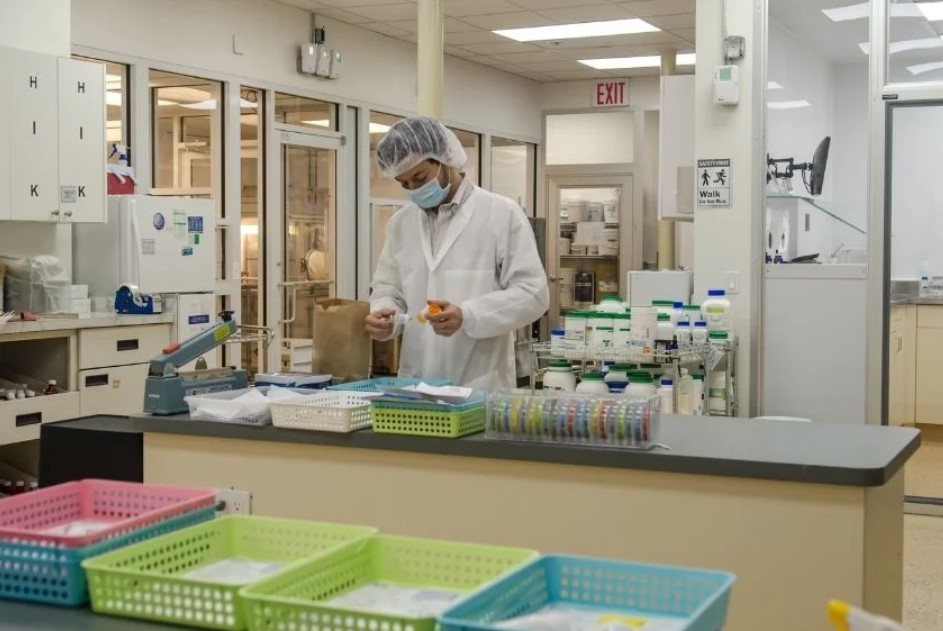The Comprehensive Guide to Pharmacy Technician Duties and Responsibilities

In the bustling world of healthcare, pharmacy technicians play a crucial role. They act as the backbone of the pharmacy, ensuring that everything runs smoothly and efficiently. This article delves into the detailed duties and responsibilities of pharmacy technicians, shedding light on their essential contributions to patient care and the healthcare system. For more detailed information, you can visit pafikotapasarwajo.org.
Understanding the Role of a Pharmacy Technician
What is a Pharmacy Technician?
A pharmacy technician is a healthcare professional who works under the direct supervision of a licensed pharmacist. They assist in preparing and dispensing medications, managing inventory, and performing various administrative tasks. Pharmacy technicians are integral to maintaining the workflow within a pharmacy, whether in a hospital, retail, or other healthcare settings.
Educational Requirements
To become a pharmacy technician, one must complete a postsecondary education program, which can range from a certificate to an associate degree. These programs cover essential topics such as pharmacology, medication dosage, and pharmacy law. Additionally, most states require certification, which can be obtained by passing an exam from a recognized certifying body like the Pharmacy Technician Certification Board (PTCB).
Skills and Qualities
Pharmacy technicians need a blend of technical and interpersonal skills. Attention to detail, proficiency in math, and a solid understanding of medication names and uses are crucial. Additionally, excellent communication skills and the ability to work well under pressure are essential qualities for success in this role.
Core Responsibilities of Pharmacy Technicians
Preparing Medications
One of the primary responsibilities of pharmacy technicians is preparing medications. This involves accurately measuring, mixing, and labeling prescriptions under the guidance of a pharmacist. They ensure that each prescription is prepared with precision to guarantee patient safety and efficacy of the medication.
Dispensing Medications
Pharmacy technicians are responsible for dispensing medications to patients. This includes verifying patient information, ensuring the correct medication is provided, and offering basic usage instructions. Technicians must be meticulous in checking for potential drug interactions and allergies to prevent adverse effects.
Managing Inventory
Effective inventory management is crucial in a pharmacy setting. Pharmacy technicians track medication stock levels, order new supplies, and manage expired medications. They play a key role in maintaining an adequate inventory to ensure that the pharmacy can meet patient needs without interruption.
Administrative Duties
Maintaining Patient Records
Pharmacy technicians maintain accurate and up-to-date patient records. This includes documenting prescription details, patient allergies, and any relevant medical history. Proper record-keeping is essential for continuity of care and compliance with healthcare regulations.
Insurance and Billing
Handling insurance claims and billing is another important duty of pharmacy technicians. They process insurance information, resolve discrepancies, and ensure that prescriptions are covered by the patient’s insurance plan. This task requires a keen eye for detail and thorough knowledge of insurance policies and procedures.
Customer Service
Pharmacy technicians are often the first point of contact for patients in a pharmacy. They provide customer service by answering questions, addressing concerns, and assisting with over-the-counter medication selections. Excellent customer service skills are vital for building trust and ensuring a positive patient experience.
Regulatory Compliance
Understanding Pharmacy Laws
Pharmacy technicians must have a thorough understanding of federal and state pharmacy laws. They ensure that all pharmacy operations comply with these regulations, including proper medication storage, accurate record-keeping, and adherence to prescription guidelines. Staying updated on legal changes is crucial for maintaining compliance.
Handling Controlled Substances
Managing controlled substances requires special attention to detail and adherence to strict protocols. Pharmacy technicians assist in the secure storage, accurate dispensing, and meticulous record-keeping of controlled medications. This ensures compliance with regulatory requirements and helps prevent misuse and diversion.
Safety and Sanitation
Ensuring a safe and clean environment is part of the pharmacy technician’s responsibilities. They follow strict safety and sanitation protocols to prevent contamination and ensure the well-being of patients and staff. This includes proper hand hygiene, cleaning workspaces, and safely disposing of hazardous materials.
Specialized Roles and Settings
Hospital Pharmacy Technicians
In a hospital setting, pharmacy technicians have additional responsibilities. They prepare intravenous (IV) medications, manage patient medication profiles, and assist in clinical trials. Hospital pharmacy technicians work closely with healthcare teams to support patient care and medication management.
Retail Pharmacy Technicians
Retail pharmacy technicians work in community pharmacies, assisting customers with their prescriptions and over-the-counter medications. They manage inventory, provide customer service, and ensure the efficient operation of the pharmacy. Their role is vital in delivering accessible healthcare to the community.
Compounding Pharmacy Technicians
Compounding pharmacy technicians specialize in preparing customized medications. They create formulations tailored to individual patient needs, such as altering dosage forms or removing allergens. This role requires advanced knowledge of compounding techniques and a meticulous approach to ensure accuracy and safety.
Technological Advancements in Pharmacy
Automation in Medication Dispensing
The advent of automation in medication dispensing has revolutionized pharmacy operations. Automated dispensing systems help reduce errors, increase efficiency, and free up pharmacy technicians to focus on more complex tasks. Technicians must be adept at operating and maintaining these systems.
Electronic Health Records (EHRs)
Electronic health records (EHRs) have transformed how patient information is managed and accessed. Pharmacy technicians use EHRs to update patient records, verify prescription details, and communicate with other healthcare providers. Proficiency in EHR systems is essential for modern pharmacy practice.
Telepharmacy
Telepharmacy allows patients to receive pharmaceutical care remotely. Pharmacy technicians play a crucial role in supporting telepharmacy services by preparing medications, managing inventory, and providing virtual customer service. This emerging field expands access to healthcare, particularly in underserved areas.
Continuing Education and Professional Development
Certification Renewal
Pharmacy technicians must regularly renew their certification to stay current in their field. This involves completing continuing education (CE) courses and meeting specific requirements set by certifying bodies. Ongoing education ensures that technicians remain knowledgeable about the latest developments in pharmacy practice.
Advanced Certifications
Pursuing advanced certifications can enhance a pharmacy technician’s career prospects. Specialized certifications in areas such as sterile compounding, hazardous drug management, or medication therapy management demonstrate expertise and commitment to professional growth. These credentials can open doors to higher-level positions and specialized roles.
Career Advancement Opportunities
There are numerous career advancement opportunities for pharmacy technicians. With experience and additional training, technicians can move into supervisory roles, become pharmacy managers, or transition into other healthcare fields. Career progression often requires a combination of practical experience, advanced education, and professional networking.
Challenges Faced by Pharmacy Technicians
High Workload
Pharmacy technicians often face high workloads, especially in busy pharmacies. They must manage multiple tasks simultaneously, from preparing medications to handling customer inquiries. Effective time management and organizational skills are essential to handle the demands of the job.
Dealing with Difficult Customers
Interacting with difficult customers is a common challenge for pharmacy technicians. They must remain calm, empathetic, and professional while addressing customer concerns and resolving conflicts. Strong communication skills and a patient-centered approach are key to managing these interactions effectively.
Keeping Up with Changes in Healthcare
The healthcare industry is constantly evolving, with new medications, technologies, and regulations emerging regularly. Pharmacy technicians must stay informed about these changes to provide the best possible care to patients. This requires a commitment to continuous learning and professional development.
The Future of Pharmacy Technicians
Expanding Roles
The role of pharmacy technicians is expanding as they take on more responsibilities traditionally handled by pharmacists. This includes administering vaccinations, conducting medication reviews, and providing patient education. The evolving scope of practice enhances the value of pharmacy technicians in the healthcare team.
Technological Integration
Technological advancements will continue to shape the future of pharmacy. Pharmacy technicians will need to adapt to new technologies such as robotic dispensing, artificial intelligence, and advanced data analytics. Embracing these innovations will improve efficiency and patient outcomes.
Increasing Demand
The demand for pharmacy technicians is expected to grow in the coming years due to an aging population and increasing healthcare needs. This presents numerous opportunities for those entering the field, with a positive job outlook and potential for career advancement.
Conclusion
Pharmacy technicians are essential to the healthcare system, providing critical support to pharmacists and ensuring that patients receive safe and effective medications. Their diverse responsibilities, from preparing and dispensing medications to managing inventory and providing customer service, make them indispensable in various healthcare settings. As the role of pharmacy technicians continues to evolve and expand, their contributions will remain vital to the delivery of high-quality patient care. By staying informed, pursuing continuing education, and embracing technological advancements, pharmacy technicians can look forward to a rewarding and dynamic career in the healthcare industry.




